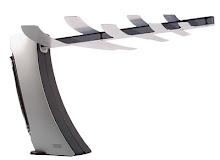HDTV Antenna - A Bird's Eye View
By Jaksa Dubljanin
There has been a lot of hype lately about having a HDTV antenna. Is it just hype or should you really get it?
First, what is the hype about having a HDTV antenna? The hype is that with the antenna, you can watch 1080i resolution broadcasts and will get better quality than satellite TV. The truth is going to hurt if you already have bought a HDTV antenna. There is really no such as a HDTV antenna.
HOW AN ANTENNA WORKS
All an antenna does is pick up frequencies. The frequencies that you pick up for your TV are Ultra High Frequencies (UHF) and Very High Frequencies (VHF). All TV broadcasts take place in the VHF and UHF bands. High definition can be part of these frequencies and you do not need a special HDTV antenna to pick them up. Your regular antenna could do the job just as well.
An HDTV antenna and a regular antenna have the same electrical and spatial properties. They must have directivity, high front-to-back (F/B) ratio and low-noise amplification when the antenna has an amplifier. If they have the same properties, why pay more to get something that is the same?
People have this perception that they need a more powerful HDTV antenna because of directivity and amplification. This is not true. HDTV is actually more noise immune than analog television and will be able to produce high quality video at significantly lower signal-to-noise ratios. Digital TV needs less antenna gain and can tolerate higher noise levels. A HDTV antenna and a regular antenna have similar directivity/gain properties so you should receive analog or digital broadcasts with the same good quality.
GHOST IMAGES
One problem that an analog antenna and a HDTV antenna have in common is that there is always a chance of a ghost creation. To get to your antenna, the signal must take many paths to get past tall buildings or other reflective structures. An antenna has to have a high F/B ratio to overcome the creation of a ghost image. There is actually more chance of getting a ghost image with a high definition TV since it has a slightly larger bandwidth. An analog antenna could handle this image better than a HDTV antenna. If the ghost images that could come up with an analog antenna or a HDTV antenna bother you, you should probably get a satellite dish. There should be no ghost image because the signal does not have to take multiple paths to get to the satellite dish. The satellite's signal goes directly up into the sky and the signal comes back from space. There are no buildings or anything else between the satellite dish and the sky.
A satellite dish can also provide more channels than an analog antenna or a HDTV antenna can provide. All the channels will all come in crisp and clear with no chance of a ghost image.
If an analog antenna or a HDTV antenna cannot provide you with the TV image that you want, you might as well go with a satellite dish and that is the truth, not hype.
This article is provided by Jaksa Dubljanin. For more information about Satellite TV news, technology, deals and offers, visit http://www.squidoo.com/satellite-tv-info/ and
http://www.nettrafficsecrets.com/offers/satellitetv.html.
This article may be freely reprinted and republished as long as the article body and resource box remain intact with all links clickable.
Article Source: http://EzineArticles.com/?expert=JaksaDubljanin
http://EzineArticles.com/?HDTV-Antenna---A-Birds-Eye-View&id=471982


